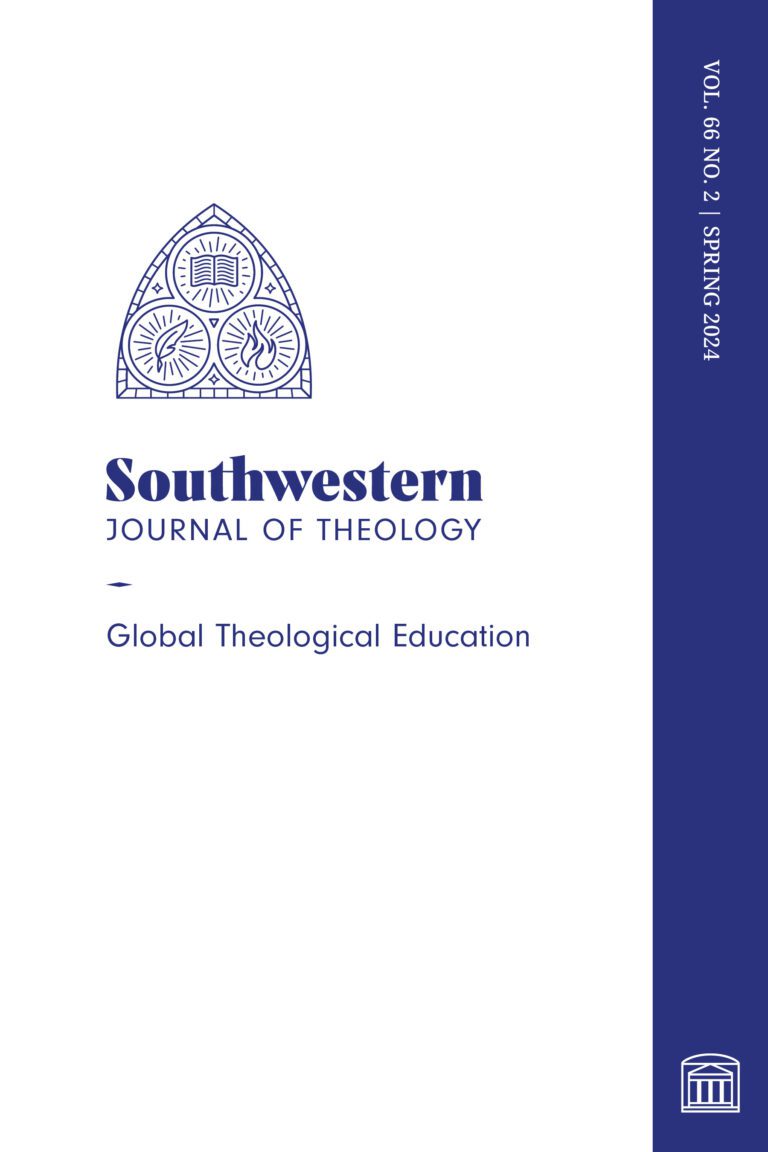
Global Theological Education
Southwestern Journal of Theology
Volume 66, No. 2 - Spring 2024
Editor: Malcolm B. Yarnell III
W. H. Bellinger is professor of religion emeritus at Baylor University, where he taught for several decades. Bellinger organizes Old Testament (OT) theology around three issues, which he likens to a three-legged stool that together are able to give stability. These three are creation theology, covenant theology, and prophetic theology. He proposes the seat of the stool should be understood as wholeness or completeness (what he calls salvation in the Latin sense of salvare, and integrity, or wholeness, in the Hebrew sense of tmm).
In the first chapter, Bellinger recounts the progression from the earliest works of Old Testament theology (think Johann Gabler) up to the twentieth century (Walther Eichrodt and Gerhard von Rad), before presenting the “shattered spectrum” (to use Leo Perdue’s term) of the early twenty-first-century post-modern landscape of OT theology. He then mentions Walter Brueggeman’s work as the first truly post-modern attempt at an OT theology by using the courtroom metaphor. Bellinger suggests his three organizing issues, instead of a traditional “center” to OT theology (like Eichrodt’s use of covenant), work within the post-modern moment. Because he presents an excellent summary of the progression of the field up to the time of this work, he is able to give the reader insight into where he contributes to the field.
Bellinger deals with method in the second chapter. His method may seem a bit tame when compared to other post-moderns, and he admits as much. He intends to give priority to the canonical shape of the text rather than the reader. Yet he stays away from prior discussions of history, remarking that they are fraught with questions. However, he does not really address what those questions might be (54). Still, Bellinger’s three-legged approach shines through in the way he analyzes the canonical texts in order rather than with a thematic presentation. In his view, the proper understanding of these three ideas together brings integrity to the believing community both past and present.
With his many publications in the study of Psalms, it is little wonder Bellinger suggests the book is the most important for understanding the theology of the entire OT. He describes his method as one that begins by identifying these three “theologies” within the Psalter and then interpreting the rest of the OT through that lens. He considers the Psalms the confession of faith by the people in the OT.
Though Bellinger does not technically suggest a “center” to OT theology, his three-legged stool functions similarly to a “center” in that he each of his categories is sufficiently broad enough to encompass all the canonical material within them. For example, his category of “creation theology” does deal with the act of creation, but also blessing and wisdom. Furthermore, “covenant theology” envelops not just the major covenants, but also the ideas of deliverance and instruction. Finally, his notion of “prophetic theology” consists of speech by God, speech by mankind, as well as mankind’s acts of repentance. Bellinger teases these three beliefs out of each section of the canon: Torah, former prophets, wisdom literature, and latter prophets. Keeping true to his approach, he devotes an entire chapter to the Psalms in between the former prophets (the historical books) and the rest of the wisdom literature.
Bellinger contributes to the field of OT theology with his proposal. More than just offering a critique of others, or suggesting the task is impractical, he sustains an argument for his proposal over the course of the entire Protestant canon. His respect for the canonical form (rather than source critical approaches, etc.) is rare among post-modern interpreters. Furthermore, he manages to do so in an accessible style that avoids technical jargon (unless necessary), while still providing relevant footnotes. He also models a respect for the work of others, though he works from a perspective within a specific faith community (Texas Baptists).
Having said this, Bellinger’s contribution does have some vulnerabilities. His description of how his three theologies can be found in each section of the canon feels a little stretched at times. For example, his description of the minor prophets is brief and does not address “covenant theology” often. Similarly, in discussing the Pentateuch, his remarks about prophetic theology mostly describe acts of deliverance. One issue he attempts to avoid is the problem that having a single “center” to OT theology often stretches that central idea. Still, his three-part proposal seems to suffer a similar fate. In addition, his remarks about salvation—he describes “salvation” as “wholeness of life” (62)—may leave some evangelicals wondering if he believes in a literal hell. Then, how he cites his work when suggesting the arguments on current scholarship on Psalms seems puzzling. While it may be true, it can come across as odd at the very least.
In conclusion, the book is accessible enough for undergraduate students to learn from, yet conversant with the field in such a way that even graduate students can glean several insights. Its contribution to the field from a faithful perspective makes it worth recommending to all students of the OT.





